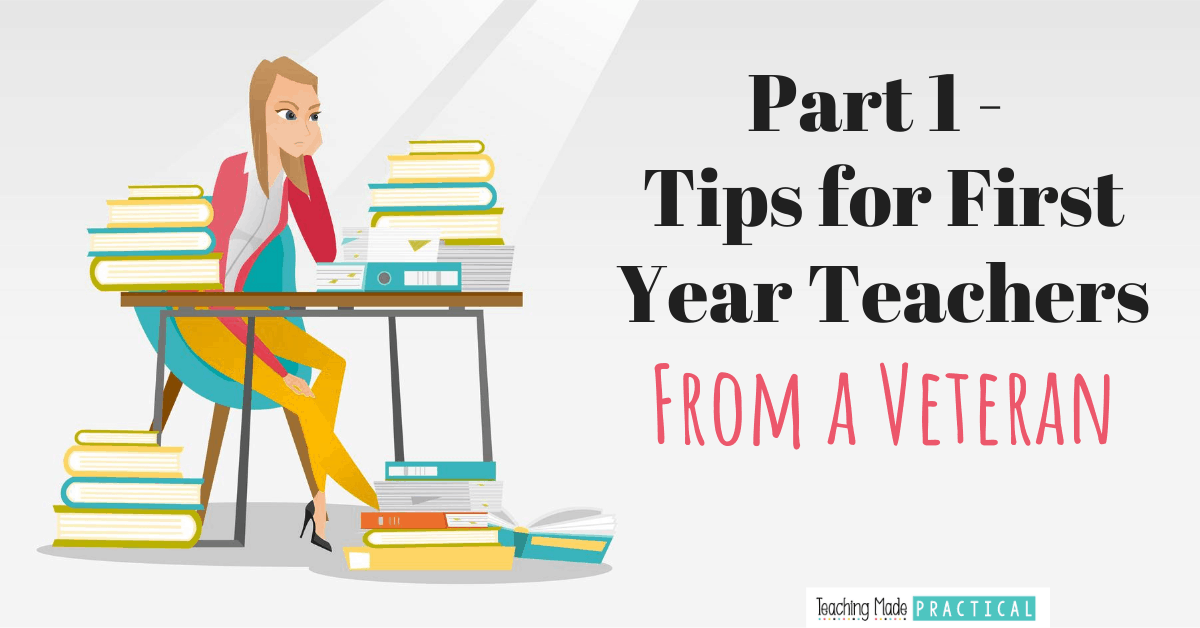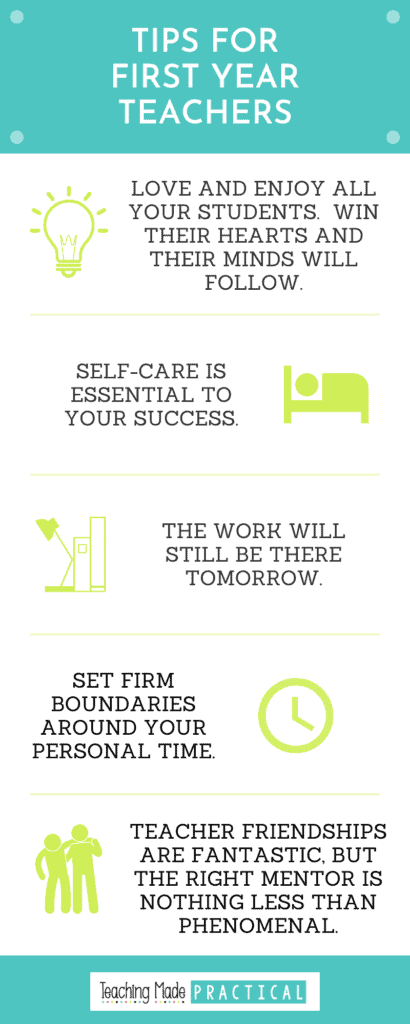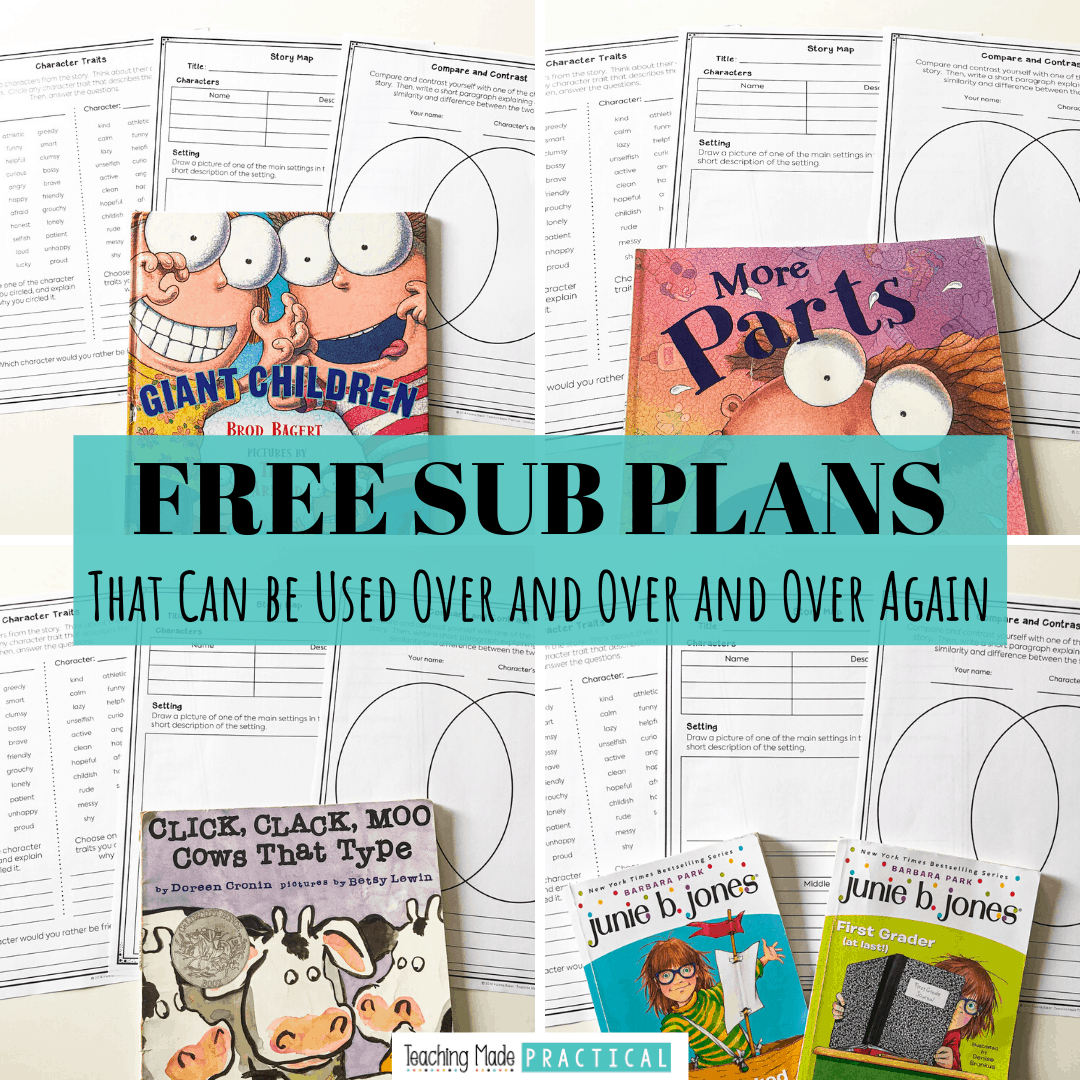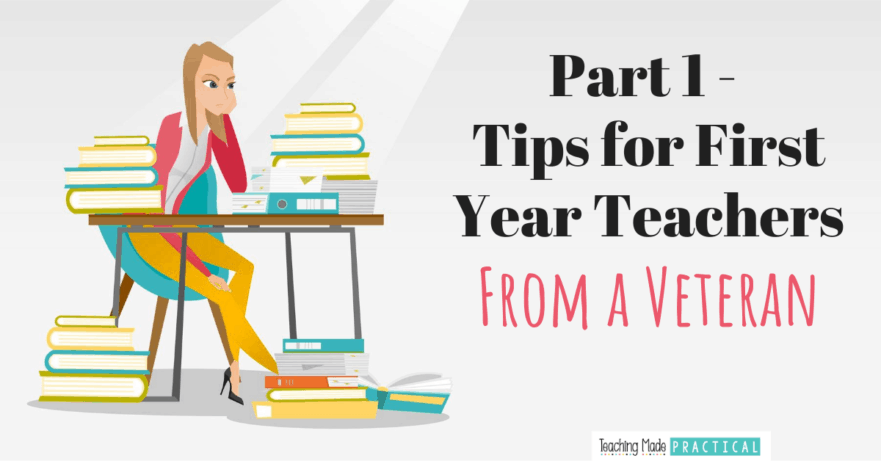
Tips for a First Year Teacher Written by Veteran Teacher Cindy Koopmans
You’ve jumped through all the hoops set before you with aplomb and finally, you have your diploma in your right hand and your teaching license in your left hand. You’re packed to the tip-top of your brain with pedagogy, educational theory, and research. Professors and mentor teachers have shared their wisdom and cheered you on. All your hard work and effort has paid off. You made it. You are at the finish line. No! You are at the starting line.
You are a teacher!
There’s nothing that equals the feeling you get walking into your own classroom for the first time. It is all yours. You are in the driver's seat.
What veteran teachers say is true. College doesn’t really prepare you for the real world of teaching. I have to say, that’s true.
Which class taught you how to deal with a vomiting child? What are you going to do the first time you encounter an over the top angry parent? The first time you catch a student plagiarizing, what is your plan?
These are all situations you will learn to handle as you move through your career. Thankfully, those won’t all happen on your first day of your teaching career. And always remember, you’re not doing this alone. You are going to have teammates, administrators, and support staff that are ready and waiting to help you.
5 Tips for a First Year Teacher
I’m a veteran of teaching, having taught for decades at many different grade levels and in many different schools in two different states. My whole purpose in this article is to share the top ten things I wish someone had told me when I started out as a teacher.
I don’t want to come off as arrogant or know it all, because honestly, I do not know it all! I’m constantly learning new things from reading, attending workshops, listening to my colleagues, and reflecting on my mistakes.
So what this list is not, is a New Teacher Checklist, but you can find a super good one of those here. And this list is definitely not exhaustive, but I found this list of 100 Things I've Learned which I thought was super cool, too. But even this list of 100 doesn’t cover it all. (The first thing on the list is if you see a toilet, go or you might not get the chance again. That made me laugh out loud because it is true!)
This is also not a supply list. You can find the supplies teachers can't live without here.
So please do remember as you read these tips for first year teachers that they are formulated around my personal philosophy of what habits and behaviors a true educational professional should possess.

And honestly, I wish you were here sitting across from me. With the two of us face-to-face, you could ask me clarifying questions. I’d reassure you that undoubtedly you will formulate your own, very unique and special teaching philosophy. And that philosophy won’t be set in stone, but will continually evolve as you dig deeper and deeper into teacher life.
So don’t be hesitant to listen to and follow your heart. You are going to be great!
What a joy it is to work at something you love. Not everyone is blessed to be able to do that.
You must love kids or you wouldn’t have chosen this profession. You had a great teacher (or teachers) that you want to emulate. They inspired you and now you want to inspire a new generation of children. You want to make a difference. You have big, big plans and big ambitions. Go you!
Don’t forget my disclaimer as you read. My way isn’t perfect or even the absolute truth. It is colored by my personal experiences.
I want you to know that I’m truly honored that I have this opportunity to share what I’ve learned through the decades. What’s more, I’m awfully grateful that you are interested in reading what I have to say.
#1. Love and enjoy ALL your students. Win Their hearts and their minds will follow.
If you stop reading right now and ignore everything else I’ve written, do this one simple thing: wake up every morning with a commitment to love your students.
And remember, love is not a feeling. Love is a decision. Teach with your whole heart.
There are going to be 1001 distractions in your 3rd, 4th, or 5th grade classroom. Some days you will feel pulled in a million different directions. And all of this busy-ness will eat into the time you have to spend with your students getting to know who they are.
When and how are you going to listen to your students? Notice, I said “listen” because if you give them the opportunity and show them you are interested they will tell you everything they know. It is nothing short of miraculous.
I like to greet my students at the door, shake their hand, say their name and look them directly in the eye. I am obviously going to have to alter that plan in 2020 because of our current situation, but I’ll find a way.
One of my colleagues makes a habit of talking to various students one-by-one while in transit to lunch or enrichment classes. Others I know have lunch in their classroom with different groups of students on different days. Still others spend time playing games with students at recess. Your style, your choice.
Surprise! There are going to be some students that are easy to love. They’ve got excellent home support, many possess people-pleaser personalities, well-developed academic skills, and shower regularly and even brush their teeth.
In a classroom full of kids, good hygiene is incredibly important.
But there will be those who are harder to love. They don’t have much home support, they have trust issues or suffered from trauma. Perhaps they haven’t been academically successful in the past and they’ve given up on themselves. Depending on where you teach, this could be as much as a third to more than half of your class.
These are the students who really, really need you, but rather than cling to you, they often push you away in many different ways.
Love them anyway.
Please, do access additional support for these students. I’m hoping your school has a counselor, a school nurse, and a social worker on staff. Remember, these professionals can’t help you if you don’t tell them you need their help. You absolutely can’t do it all.
What is incredibly important is building a relationship with each student. When asked, “What would you like to know about your students?” The correct answer is, “Everything.”
I’ve used the Two-Minute Relationship Builder very successfully with many of my more challenging students. It really does work. You can read more about it here.
#2 Self-care is essential to your success.
Here’s reality. You can’t draw water from an empty well. You can’t love people if you yourself don’t feel loved and cared for.
And honestly, if you don’t care for yourself, who will?
All those personalities you have sitting in front of you every day demanding your love and attention? They are emotional sponges. If you are not careful, they will drain you dry.
And because they are children, they don’t really know how to practice empathy and compassion. So when you are on your last leg because you haven’t taken care of yourself, many of them will just think you are having yet another bad day.
Teacher burnout is real. This job is incredibly hard. As teachers we really are heroes, but we often feel unappreciated and we are definitely underpaid. Here’s the scary statistics:
- About half a million (15% of) U.S. teachers leave the profession every year (Seidel, 2014).
- More than 41% of teachers leave the profession within five years of starting, and teacher attrition has risen significantly over the last two decades (Ingersoll, Merrill, and Stuckey, 2014).
- TNTP (formerly The New Teacher Project) reported that almost 66% of the nation’s best teachers continue to leave the profession for careers elsewhere (Chartock & Wiener, 2014).
I’m betting, as a new teacher, you’re saying to yourself right now, “Not me!” I’d propose that just about every one of the 41% of teachers who left in the first five years had the same thought.
So what are you going to do to prevent it?
You’ve got to have a plan for self-care.
I’ve experienced this personally.
Midway through my career I taught 4th grade at an inner city school. It was the most mentally, emotionally, and physically difficult teaching job I’ve ever held and I only did it for four years.
I came dangerously close to burning out because I overloaded myself. Not only were my students challenging, both academically and behaviorally, but I had a lot going on at home as well.
My husband and I were in the midst of raising our own three boys and I was getting my masters degree in Educational Leadership. At one point, I taught elementary school all day, taught a class at the local community college at night, and took college classes as well.
I made the mistake of thinking I was superhuman. I am not, nor have ever been, superhuman.
Fortunately, I was able to find a position at a nearby district that was much less stressful. I finished my masters degree and I survived. As I look back, I can see how dangerously close I was to the abyss, but at the time, I thought I just needed to work harder.
Don'g ignore this tip for first year teachers. Learn from my mistake.
Here’s the short list for self-care. It isn’t all inclusive, simply a starting point. Create your own list and put that list somewhere you can see it every day.
- I spend 20-30 minutes every day meditating, practicing gratitude, or doing some activity to center myself and my thoughts. Journal your journey and keep a record of your progress.
- I get eight hours of sleep, eat nutritious food (start with a good breakfast), and drink plenty of water.Set aside time on the weekend to shop and prepare food that you can reheat during the week when you come home too tired to cook. Decide on a bedtime and stick to it. You can read how to prepare yourself for a restful night’s sleep here.
- I exercise regularly. Take a walk, ride a bike, do yoga, garden, or work out at a gym. You need regular physical exercise for good health. Preferably, you are spending part of every day outdoors. There’s something restorative about listening to the birds sing.
- I maintain healthy levels of alcohol and caffeine intake.I get so many Starbuck cards as gifts and you probably will too. I don’t drink all that myself, I treat others. Fortunately, I’m rarely given a bottle of wine.
- I book some spa time once or twice a month. Men, this is for you too. It’s not self-indulgent. It’s essential. Research has proven that a massage elevates your mood and provides many, many health benefits. In Europe, massages are considered a medical necessity. Look around for a masseuse that gives a teacher discount.
- I reserve time every week for fun. Spend time with people you love and who love you. Get away for the weekend. Go out to dinner with friends. Planning fun gives you something to look forward to and creates good memories you can reflect on during the week. Netflix just doesn’t offer these same benefits.
- I have the phone number of a counselor, pastor, or therapist and I know there may come a time this year when I need to use it. I know I’m cutting close to the bone here. The reality of teacher life is that it is so very difficult that we all need a neutral third party to talk to from time to time. The best thing about a counselor or therapist is that they are not your friend; therefore, that person will be completely and unabashedly honest with you and give you advice and exercises to help you become a better you. Find someone that inspires your confidence and don’t necessarily settle for the first person you meet with. It's an indication of strength, not weakness, to reach out for help when you need it. If you can hear that I am speaking as a person who has been through it, you would be correct.
#3 The work will still be there tomorrow.
I wish someone had confronted me with this truth when I was first starting out in my teaching career. There’s a weird kind of competition happening in schools that equates the amount of time you spend working with your level of devotion.
That’s just wrong on so many levels.
This year, perhaps more than any other year, it is very important for you to decide up front on your daily work hours and then stick to them. You are creating habits that will be hard to break later. I’m betting one of the reasons you became a teacher is that you liked the idea of a flexible schedule and time off in the summers. So enjoy it!
Keep track of your hours and do your best not exceed a 40 hour work week. Unless you are coaching or were recruited to be the faculty advisor for an extra curricular, you are not receiving extra pay for all those extra hours.
Because I live five minutes from my school, it is usually easy for me to show up on time...no unpredictable traffic jams. I fulfill my responsibilities as diligently as I can (remember, we all have our bad days) and depart within 30-45 minutes of the time the students are dismissed.
One night a week I will stay until 5:30 or 6 and grade papers (use rubrics to make this easier). I allow myself that one late night once a week. It’s not unusual for one of my dearest colleagues to come stand in my doorway and say loudly, “What are you doing here? Go home!” It makes me laugh. She’s keeping me accountable and I love her for that.
I wish I’d maintained this schedule throughout my entire teaching career, but there were many nights as a young teacher that I neglected my family and my self-care to be what I thought at the time was a better teacher. I was wrong. Learn from my mistake.
Now, for my own sanity, and so I am able to love my students better, I do not stay late every day and I do not take student papers home to grade. I’ve found that if I grade student papers in the evening and feel disappointed with their performance, I’ve got some residual feelings the next morning.
I want to be a teacher who gives her students a fresh start every day. So I’ve made a decision to grade papers at school, exclusively.
I have a colleague that arrives at school a full hour before the students, stays about 30 minutes after school, and rarely stays more than an hour past dismissal. That’s her rhythm and it works for her. Early mornings don’t work for me.
I know teachers who work all summer planning for the school year and those who do virtually nothing until it is time to report. And both types of teachers are incredibly dedicated and highly-skilled teachers.
Don’t allow the unrealistic expectations of yourself sabotage your self-care. Relax. Remember that loving your students is the most critically important thing you can do and you can’t do that well if you are exhausted. You can explore more about the importance of rest in this article here. I hope you will take the time to read. It is a short article and oh so good.
#4 Set firm boundaries around your personal time.
You are a fresh, enthusiastic member of the faculty with loads of ideas and lots of energy. So you are going to be asked to serve and volunteer in many different ways.
But whatever the reason, just make up your mind that you will set firm boundaries around your personal time, especially because this is the critically important first year of your career.
This year, just say no.
I’m a people pleaser, so this is very difficult for me personally. If I’m not careful, the word yes comes out of my mouth so fast that I think, “Who just said that?” Don’t be like me.
If you are an elementary school teacher, you have to be even more cautious. For some reason, elementary teachers are called upon more often to serve, volunteer, and show up than secondary school teachers. Or maybe middle and high school teachers have figured out how to be more cavalier about it.
No one is going to say no for you, because no one else has the time or the energy to guard your schedule except you.
If you’re really tempted to say yes, ask for 24 hours to think about the opportunity you are being offered. Once you’ve said the word yes, and realize that you’ve taken on too much, it is very difficult to reverse your decision. Your parents probably told you: No one likes a quitter.
So just say no right off the bat and avoid that awkwardness.
#5 Teacher friends are fantastic, but the right mentor is nothing less than phenomenal.
You’re going to make a lot of friends at the school where you teach. Friendships are wonderful and collegial friendships are so very important. You need people to go to for help and support. You need someone to ask these questions to at the beginning of the school year so you know the school's unwritten rules.
I really hope that you end up being on a fantastic team of friendly people who completely support you this year in every way imaginable.
But a mentor is different...and invaluable. Some schools appoint a mentor for new teachers. That’s great. Get to know that person, but if you don’t click with them, don’t stress about it. I’ve worked at schools where people volunteered to mentor, and they weren’t necessarily the best person for the job.
You select someone to watch and emulate. This will be your go-to person, so take your time and don’t rush your decision. Look around for a veteran teacher and slowly cultivate a meaningful relationship with that person.
You want someone that does not see you as a competitor, because the truth is, many teachers are highly competitive with one another. You also want to be able to totally open up with this person. If you tell a story more than once, it’s gossip, but everyone needs someone they can trust who will give them their honest opinion in a kind and helpful way.
Upon reflection, you can see how someone who fits this description can have an incredible impact on your success this year, so really take your time in determining who to invite to become your mentor.

Never Stress Over Sub Plans Again!

Make copies, find a fiction book, and you'll be ready for any emergency that comes your way!


